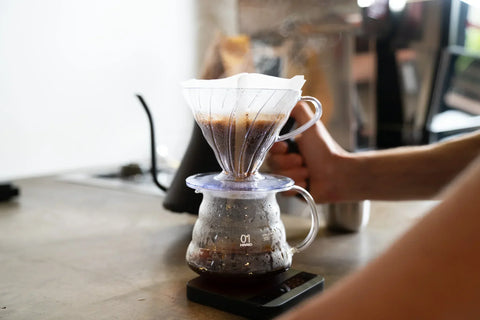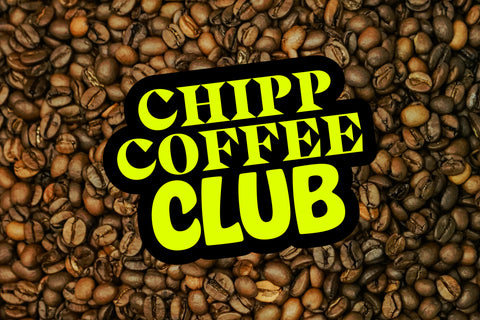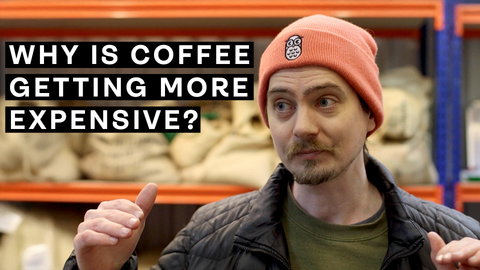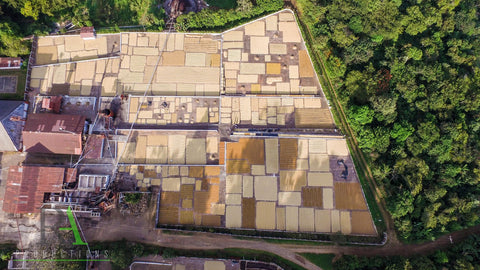
You may have heard the big scary word Mycotoxin thrown around in the coffee world over the last few years but what actually are mycotoxins and are they something you need to be worried about? In short the answer is no but lets get into it and see what all the fuss is about.
What are Mycotoxins?
Mycotoxin sounds like a very scary word but in reality to simply refers to toxins formed by mould if products like crops, grains and coffee beans are improperly stored. These toxins can be detrimental if you ingest too much but unless you're eating tablespoons of mould spores with every meal you should be fine.
Not all mould is bad though! There have been a number of cases throughout history where mould has been used to create pharmaceutical drugs such as penicillin, anti-migraine drugs and the list goes on! Various other foods and beverages contain measurable — but acceptable — levels of mycotoxins as well, such as grains, raisins, beer, wine, cereal, dark chocolate, and peanut butter.
Like with all food products, foreign bodies such as mycotoxins are always going to be present as they are quite literally everywhere which makes it impossible to avoid them completely.
Do mycotoxins make coffee more bitter? No this is completely incorrect and evidence to suggest that mycotoxins have anything to do with it is lacking.. The amount of caffeine in coffee determines its bitterness and this is controlled through roasting processes. This is also why robusta coffee is often considered bitter as it has twice the caffeine content as arabica beans.
Mycotoxins in Coffee
Are there mycotoxins in your cup of coffee? Yes. Do you need to be worried about it? No. These are well known and researched concerns and coffee producers have efficient and effective processes to negate them as much as possible.
The most effective method of mould prevention in coffee is called wet processing, or washed processing. During this process the beans are de-pulped to remove their outer skin where they are then washed clean from all the flesh and juices left over from the coffee cherries and dried evenly ensuring an even roast and all potential defects removed at the source.
While every attempt has been made to remove or reduce the microscopic amount of mycotoxins in coffee, roasting the beans also significantly reduces the amount of mycotoxins by killing the mould that produces it. Just like with cooking any food product, as it is roasted and prepared it becomes safe for consumption. According to a study conducted, roasting can reduce the amount of specific types of mycotoxin by 69-96%.
Furthermore, coffee’s quality is rated according to a grading system, and the presence of moulds or mycotoxins significantly lowers this score. What’s more, crops get discarded if they exceed a certain level of toxins so any crops of concern are removed before even make it to our shores.
Specialty coffee is the highest quality grade a coffee can be given and often requires significantly more delicate and meticulous harvesting and development which in turn reduces the chance of mould and defects. Steps to ensure quality are also implemented at every step of the harvesting and processing to ensure only the highest quality beans are used. Roasters like ourselves also conduct regular quality control tests to examine batches for mould or defects in the final product so every cup you purchase from us is always going to be the best brew possible.
Decaf coffee, while still at negligible levels, tends to be higher in mycotoxins. This is because caffeine, which is removed from decaf coffee, helps stop the growth of moulds. Instant coffee also contains higher levels than regular coffee, but they are still too low to be of concern.
The Health Benefits of Specialty Coffee
Specialty coffee is rich in antioxidants which help keep you healthy for longer! Antioxidants have been shown to reduce inflammation and reduce the risk of chronic diseases such as cancer, heart disease and diabetes. The specialty processing and harvesting methods also help preserve these antioxidants ensuring that you receive a good dose of all the good stuff with every cup.
It's no secret that coffee is a mood enhancer and specialty coffee no different. Caffeine is a well known mood booster and can reduce the risk of depression and improve overall mental wellbeing. This combined with a more conscious and active brewing method such as a V60 can help create a peaceful ritual to take a moment for yourself.
Long term studies have just recently shown that morning coffee drinkers are also 16% less likely to die of any cause and 31% less likely to die from cardiovascular disease than non-drinkers.
Mycotoxins - The Verdict
In summation, mycotoxins are in basically everything but they are totally harmless in the almost non-existent quantities that can occur in food products. The research shows that the benefits of specialty coffee far outweigh the potential negatives and there is no evidence to suggest that low level of mycotoxin exposure is harmful. While they may be present in microscopic amounts, the level of care that goes in to growing, harvesting, processing, roasting and packing your beans means that you have nothing to worry about and can drink your Chipp Coffee Co beans with confidence each and every time.









